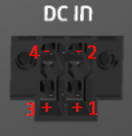DSBOX-NX2 Getting Started
WHAT YOU WILL LEARN?
1- Overview of DSBOX-NX2
2- Power Socket & Polarization
3- JetPack Installation & Interface Guide
ENVIRONMENT
Hardware: DSBOX-NX2
OS: Applied all JetPack versions
DSBOX-NX2 is industrial fanless box pc with Nvidia Jetson Xavier Nx. We will explain how to get started with DSBOX-NX2 on this blogpost.
You can see the front view of DSBOX-NX2.

You can see the rear view of DSBOX-NX2.

Power Socket & Polarization
Before you plug in DC power cable, you should plug in Ethernet cable, keyboard and mouse usb cables to usb ports and HDMI cable to HDMI port socket for monitoring the system. After connections are done, you can plug in the DC power cable to “DC IN” socket. If you have auto power version of DSBOX-NX2, the system runs as soon as you plug the DC power cable in. If you have other version, you should press power button which is located on the front side. The DC Power Source should be in the range of 9-28 Volt DC. You can find the DC Power socket when you open the package of the product.
You can see the power connector pinout below. First and third pins are positive polarization, second and fourth pins are negative polarization.

You can have DC Power Adapter, GPIO Mating Socket, HDMI Cable and Ethernet Cable as optional.
JetPack Installation & Interface Guide
After you energize the board, the system runs. The industrial box pc has preinstalled operating system (Ubuntu 18.04) but if you would like to upgrade or downgrade the software version, please click here. When the Ubuntu Desktop show up, you will need to user name and password. Both the user name and the password are “nvidia”.
If you would like to use CANBus interface , please click here.
If you would like to use Industrial Input Output pins, please click here.
If you would like to use serial communication interfaces(RS232,RS422,RS485), please click here.
Thank you for reading our blog post.


